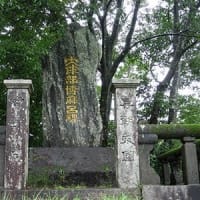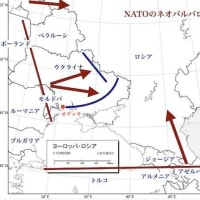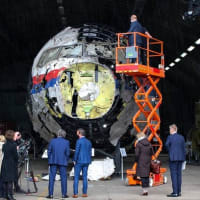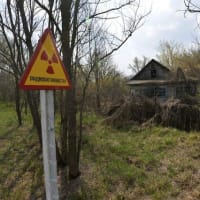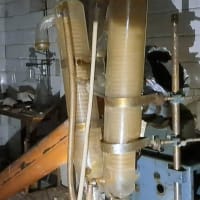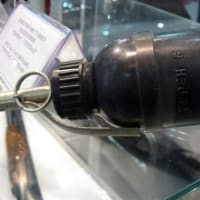昨今の北朝鮮核問題、私達が知る北朝鮮核問題のマスコミ報道は、何か怪しくなります。どうも北朝鮮の核施設等を支援していた人達が見え隠れするようです。
フォーチュン誌2003年5月12日号掲載記事の英文の概訳ですが、誤訳等あるかも知れませんが・・・原文(英語)は最後に載せておきます。
ーーーーーーーーーーーーーーーーーーーーーーーーーーーーーー
北朝鮮コネクション・・・ラムズフェルド国防長官は、北朝鮮核施設建設のためのABBの取引について何を知っていましたか・・・何故、それについて話さないですか?
(リチャード・ベアール執筆、研究協力・ブレンダ・チェリー 2003年5月12日)
ラムズフェルド国防長官は自分の主張を留めておくようなことをしない人で、勿論妥協もしません。北朝鮮政権については明確に軽蔑しています。アメリカ政府が北朝鮮に対し、核兵器開発計画の断念引き換えに、2基の軽水炉建設計画同意に対し論議を呼びました。
1994年の取り決め、ラムズフェルド国防長官見解に関する公的記録が存在しない事実、非常に驚かされます。
驚くのは、北朝鮮の軽水炉建設設計と基本部位を提供する2億ドル事業受注企業の役員に就いていました事実について、ラムズフェルド国防長官が黙っていることです。
スイス・チューリッヒを本拠とする巨大企業ABB社(電力関連、重電、重工業を主たる業とする、スイスに本社を置く典型 的多国籍企業で、100カ国以上に進出)、北朝鮮との契約は2000年締結、ラムズフェルド国防長官が役員職を辞任してブッシュ政権に入るより前のことです。
ラムズフェルド国防長官は、1990年~2001年初頭まで、唯一人アメリカ人役員としてABB社取締役会にいましたが、その会社が北朝鮮の軽水炉開発事業契約受注競争に加わったことを公的には言っていませんでした。フォーチュン誌(タイム・ワーナーの子会社タイム社、Time Incがタイム と共に発行する雑誌、発行部数100万部、通常年間で23号が発刊され、世界120ヵ国でおよそ500万人が読む世界最大の英文ビジネス誌)調査でも、同事業についてどういう考えをもっていたかについて示した公的記録は一切発見されませんでした。今年2月、北朝鮮の軽水炉開発にラムドフェルド国防長官の役割についてニューズウィーク誌に質問された際、国防長官の広報担当者ビクトリア・クラークは決済が問われた事項ではなく、彼女の上司、ラムズフェルド国防長官はその事業がいかなる時点で役員会に提示されたのか思い出せないと回答しました。
ラムズフェルド国防長官が果たした役割についてフォーチュン誌は細部説明を求めましたが、回答を拒否しています。ABB社広報担当者ビョルン・エドランド氏は、フォーチュン誌の取材に役員達は当該事業について説明を受けていた。と語っています。他のABB社職員の話によれば、そのような巨額の重要な事業の場合は、法的等責任問題も絡むので、ABB社の監査を通さないことはありえないと言っています。契約締結前に、業務概要書類が役員会で提示されているはずです。ABB社、米国支社核開発事業部、前社長で、当該事業指揮者ロバート・ニューマン氏は、役員なら当然知っていたはずですと言っています。
平壌の開発事業に入札時にABB社役員を務めていた15人に本誌が質問したところ、1人を除いて全員がコメントを拒否しました。匿名を条件に答えた役員は、当時のABB社会長パーシー・バーネヴィク、1990年代中盤に役員会で北朝鮮の軽水炉開発事業について説明したといっています。ABB社にとっては一大事でしたと前役員は言っています。そのために大規模な政界ロビー活動が行われました・・・
前役員は、1990年代半ばにライバルのアメリカ企業が外資系企業が政府の仕事を受注しようとしていると不満を表明した件で、ラムズフェルド国防著巻はワシントンでABB社のためにロビー活動を行うように依頼されたという話を憶えていました。前役員は詳しく説明しませんでしたが、1995年までABB社の発電設備事業指揮者、ゴラン・ランドベルグ氏は、一時期ラムズフェルド国防長官が関わっていたのは間違い有りませんと語っています。ゴラン氏によれば、合衆国政府との契約が必要な際は役員の助けにより事業を受注することは珍しいことではなかったといっています。他幹部経験者達はラムズフェルド国防長官の関わりについて覚えていませんでした。
当時、ラムズフェルド国防長官は、イラク戦争以来の戦勝で、北朝鮮の体制変革計画等について検討していたと伝えられています。しかし、原子炉開発をめぐるラムズフェルド国防長官の沈黙は、ABB社役員時代に何を実施したのか、しなかったのかについて重大な問題を提起しています。ABB社の核開発事業に大きな関心を示し、多くの取締役会に出席していたラムズフェルド国防長官が他役員相手に自分の見解について示した証拠はありません。確かに当該事情を公にしたことはありませんが、ラムズフェルド国防長官を知る多くの人達は、軽水炉から核兵器に使用可能な核物質を抽出可能として批判的な見方をしています。ラムズフェルド国防長官の同僚、ポール・ウォルフォウィッツ、ジェイムズ・リレイ、リチャード・アーミテージは、北朝鮮との軽水炉開発取引に反対していた事実が記録に残っています。過去、ラムズフェルドが選挙責任者兼国防アドバイザーを務めた大統領候補ボブ・ドール氏も反対でした。ラムズフェルド国防長官が役員に就任した基金から資金提供を受けたシンクタンク、核不拡散政策教育センター所長、ヘンリー・ソコルスキ氏は1994年の取引に関して大反対する人でした。
ラムズフェルド国防長官の意図を知る手がかりは、1998年にヘリテージ財団でのスピーチです。軽水炉開発については触れませんでしたが、1994年の北朝鮮との枠組みの合意は核の脅威を終結させるものではなく、ただ単に罰を先延ばしするだけのものでしかなく、北朝鮮がどれだけの爆弾材料を手に入れるかについては分らないままです。記事データベースを検索して当時の記事を調べた結果は、1990年代を通じて、ラムズフェルド国防長官が、北朝鮮の軽水炉を開発した企業の役員であった事実を伝える報道は見つかりませんでした。ラムズフェルド国防長官もそれを表明することはありませんでした。
韓国で8基の原子炉を建設しているABB社は、米国がスポンサーとなった40億ドルの北朝鮮軽水炉開発事業計画に関して有利な立場にありました。事業受注は間違いなしと伝えられていたと、同事業計画の責任者を務めたフランク・マレイ氏は言っています。同氏は、現在ウェイスティングハウス社で同じ役職に就いています。ウェイスティングハウス社は1999年に英国BNFL社に買収されました。英国BNFL社はその1年前にABB社核開発部門を買収しています。北朝鮮の原子炉は、もともと韓国と日本の輸出入銀行から資金提供を受け、ニューヨークのKEDO(Korean Peninsula Energy Development Organization、朝鮮半島エネルギー開発機構)によって監査されることになっていました。問題はありませんと、1997年から2001年までKEDOの事務局長を務めたデザイク・アンダーソン氏は言っています。それは実務的理由からでした・・・
それでも、ABB社は同事業への関与を内密にしようとしています。フォーチュン誌入手した、ABB社からエネルギー省に送られた1995年の或る手紙では、同社は北朝鮮への技術供与に対し承認を申請すると共に、手紙を機密扱いにするよう求めていました。内密にされる理由は様々です・・・ABB社の米国広報担当者ロナルド・カーツ氏はこの巨額の事業は典型的、契約というものはそんなに人目に触れるものではないのです!
ABB社は事業に目立たぬようにしていますが、カーツや他の職員の話・・・役員達は事業内容について知っていたはずと言っています。前ABB社幹部のニューマン氏によると、リスク評価の概要を記した書類がバーネヴィク氏(前会長)宛てに渡っていると言われています。バーネヴィク氏はフォーチュン誌の電話取材に回答しませんでしたが、チューリッヒ本社勤務のニューマン氏の上司ハワード・ピアース氏は、ラムズフェルド国防長官について、役員会に居たから、知っていて当然です!
ラムズフェルド国防長官は実践的な役員でした。ABB社世界核開発事業を率いたディック・スレマー氏によれば、ラムズフェルド国防長官は時々電話で核拡散問題について話しすることがあり、正しい方向性を理解させるのに苦労したと言っています。ピアース氏は、ラムズフェルド国防長官がABB社の核開発事業受注のために中国訪問を思い出し、考えを変えさせるのが困難な人物でした。彼の意見を変えるには困難です。ABB社米国核開発事業部、前部長シェルビー・ブルワー氏は、コネチカット本社会議でラムズフェルド国防長官と会ったことを思い出し、素晴らしく才気ある人物と思った。ヨーロッパを相手に熱いナイフでバターを切るみたいに。
関係者の誰も、北朝鮮の事業について話すラムズフェルド国防長官については記憶にないといっています。彼が意見を隠しているとしたら、他の人たちは隠していないでしょう。共和党は最初から北朝鮮核開発事業に反対、1994年に両院を制してからは顕著です。枠組み合意は署名して2週間後には政策上の孤児になっていました。KEDOの初代事務局長で前駐韓国米大使のスティーブン・ボスワースは、枠組み合意がなぜ問題なのか理解するのは易しい、北朝鮮はテロ支援国家リストに含まれており、核拡散防止条約にも多く違反している。1994年の枠組み合意の指揮を執った国務次官ロバート・ガルッチは批判に同意しないと言っています。もし合意がなかったら、北朝鮮は戦争か、核兵器製造のどちらかしかありませんでした。
専門家が指摘する問題は、軽水炉から兵器への転用可能な核物質を抽出するのは困難だが可能ということです。再処理はそれほど難しくはない。原子力委員会と原子力規制委員会の上級委員ビクター・ジリンスキー氏は特別な機材は要りません、KEDOの連中はそこがわかっていない。未だに間違いを続けています。
軽水炉開発に対する共和党勢の抗議声、ラムズフェルド国防長官は聞く耳を持っていません。クリントン政権の東アジア・太平洋問題担当国務次官ウィンストン・ロード氏は共和党員のほとんどは文句言っていました。ロード氏はラムズフェルド氏の主張について憶えていないといっています。反KEDOを熱烈に唱える国防政策センターのフランク・ギャフニー・ジュニアもまた同じです。ギャフニー氏によると、ラムズフェルド氏はABB社役員としての立場が議論を巻き起こすことを恐れていたようです。
1998年には、ワシントンで議論沸騰し、軽水炉開発の遅れは北朝鮮を苛立たせました。兵器査察官はもはや北朝鮮の核物質の在庫を確認できなくなりました。マレイ氏によれば、1998年のある時点で、ABB社は公式な入札招待を受けたといわれています。その時ラムズフェルド氏は何処に?その年、下院主催の研究会議で大陸弾道ミサイル危機に関する機密情報を検証していました。会議では、北朝鮮が合衆国本土を5年以内に攻撃可能になると結論が出ました。報告書提出から数週間後、北朝鮮は日本に向けて3段ロケット発射、さらにその会議では、北朝鮮が核兵器開発プログラムを継続していると結論づけましたが、そのようなプログラムを阻止するはずの軽水炉事業の件については巧妙に省かれていました。会議の報告書に記されたラムズフェルド氏の経歴には、彼がABB社役員であるとの記述はありませんでした。
クリントン大統領退任直前、北朝鮮がミサイル開発と核開発を諦める代わりに支援再開と関係正常化を図る大胆な取引を持ちかけるつもりでした、しかしブッシュ大統領は北朝鮮側の意図に懐疑的で、2001年3月に政策再考を呼びかけました。2ヵ月後にエネルギー省は、ラムズフェルド指揮下の国防総省と相談した結果、北朝鮮への核開発技術供与の再承認を行いました。ウェスティング・ハウスと北朝鮮高官が出席する起工式は2001年9月14日に開催、この日は米国本土に対する史上最悪のテロ攻撃が発生してから3日後です。
ブッシュ政権は未だに北朝鮮核開発事業計画を破棄していません。エドワード・マーキーと他の議員達は、ブッシュとラムズフェルドに対し、彼等が核兵器製造工場と呼ぶ軽水炉事業への支援を取りやめるよう手紙で要請しましたが、それにもかかわらず、コンクリート注入セレモニーが昨年8月に開催、ウェスティング・ハウスは北朝鮮に対し10月まで技術訓練プログラムへの支援を行いました。直後に北朝鮮側は極秘ウラン再処理計画を認め、武器査察官を追い出し、プルトニウム抽出を行うと発表しました。ブッシュ政権は核開発技術供与の延長を停止したが、1月に北朝鮮の事業計画に対し350万ドルの予算を承認しています。
原文
Rummy's North Korea Connection What did Donald Rumsfeld know about ABB's deal to build nuclear reactors there? And why won't he talk about it?
By Richard Behar Research Associate Brenda Cherry
May 12, 2003
(FORTUNE Magazine) – Defense Secretary Donald Rumsfeld rarely keeps his opinions to himself. He tends not to compromise with his enemies. And he clearly disdains the communist regime in North Korea. So it's surprising that there is no clear public record of his views on the controversial 1994 deal in which the U.S. agreed to provide North Korea with two light-water nuclear reactors in exchange for Pyongyang ending its nuclear weapons program. What's even more surprising about Rumsfeld's silence is that he sat on the board of the company that won a $200 million contract to provide the design and key components for the reactors.
The company is Zurich-based engineering giant ABB, which signed the contract in early 2000, well before Rumsfeld gave up his board seat and joined the Bush administration. Rumsfeld, the only American director on the ABB board from 1990 to early 2001, has never acknowledged that he knew the company was competing for the nuclear contract. Nor could FORTUNE find any public reference to what he thought about the project. In response to questions about his role in the reactor deal, the Defense Secretary's spokeswoman Victoria Clarke told Newsweek in February that "there was no vote on this" and that her boss "does not recall it being brought before the board at any time."
Rumsfeld declined requests by FORTUNE to elaborate on his role. But ABB spokesman Bjorn Edlund has told FORTUNE that "board members were informed about this project." And other ABB officials say there is no way such a large and high-stakes project, involving complex questions of liability, would not have come to the attention of the board. "A written summary would probably have gone to the board before the deal was signed," says Robert Newman, a former president of ABB's U.S. nuclear division who spearheaded the project. "I'm sure they were aware."
FORTUNE contacted 15 ABB board members who served at the time the company was bidding for the Pyongyang contract, and all but one declined to comment. That director, who asked not to be identified, says he's convinced that ABB's chairman at the time, Percy Barnevik, told the board about the reactor project in the mid-1990s. "This was a major thing for ABB," the former director says, "and extensive political lobbying was done."
The director recalls being told that Rumsfeld was asked "to lobby in Washington" on ABB's behalf in the mid-1990s because a rival American company had complained about a foreign-owned firm getting the work. Although he couldn't provide details, Goran Lundberg, who ran ABB's power-generation business until 1995, says he's "pretty sure that at some point Don was involved," since it was not unusual to seek help from board members "when we needed contacts with the U.S. government." Other former top executives don't recall Rumsfeld's involvement.
Today Rumsfeld, riding high after the Iraq war, is reportedly discussing a plan for "regime change" in North Korea. But his silence about the nuclear reactors raises questions about what he did--or didn't do--as an ABB director. There is no evidence that Rumsfeld, who took a keen interest in the company's nuclear business and attended most board meetings, made his views about the project known to other ABB officials. He certainly never made them public, even though the deal was criticized by many people close to Rumsfeld, who said weapons-grade nuclear material could be extracted from light-water reactors. Paul Wolfowitz, James Lilley, and Richard Armitage, all Rumsfeld allies, are on record opposing the deal. So is former presidential candidate Bob Dole, for whom Rumsfeld served as campaign manager and chief defense advisor. And Henry Sokolski, whose think tank received funding from a foundation on whose board Rumsfeld sat, has been one of the most vocal opponents of the 1994 agreement.
One clue to Rumsfeld's views: a Heritage Foundation speech in March 1998. Although he did not mention the light-water reactors, Rumsfeld said the 1994 Agreed Framework with North Korea "does not end its nuclear menace; it merely postpones the reckoning, with no assurance that we will know how much bomb-capable material North Korea has." A search of numerous databases found no press references at the time, or throughout the 1990s, noting Rumsfeld was a director of the company building the reactors. And Rumsfeld didn't bring it up either.
ABB, which was already building eight nuclear reactors in South Korea, had an inside track on the $4 billion U.S.-sponsored North Korea project. The firm was told "our participation is essential," recalls Frank Murray, project manager for the reactors. (He plays the same role now at Westinghouse, which was acquired by Britain's BNFL in 1999, a year before it also bought ABB's nuclear power business.) The North Korean reactors are being primarily funded by South Korean and Japanese export-import banks and supervised by KEDO, a consortium based in New York. "It was not a matter of favoritism," says Desaix Anderson, who ran KEDO from 1997 to 2001. "It was just a practical matter."
Even so, ABB tried to keep its involvement hush-hush. In a 1995 letter from ABB to the Department of Energy obtained by FORTUNE, the firm requested authorization to release technology to the North Koreans, then asked that the seemingly innocuous one-page letter be withheld from public disclosure. "Everything was held close to the vest for some reason," says Ronald Kurtz, ABB's U.S. spokesman. "It wasn't as public as contracts of this magnitude typically are."
However discreet ABB tried to be about the project, Kurtz and other company insiders say the board had to have known about it. Newman, the former ABB executive, says a written summary of the risk review would probably have gone to Barnevik. Barnevik didn't return FORTUNE's phone calls, but Newman's Zurich-based boss, Howard Pierce, says Rumsfeld "was on the board--so I can only assume he was aware of it."
By all accounts Rumsfeld was a hands-on director. Dick Slember, who once ran ABB's global nuclear business, says Rumsfeld often called to talk about issues involving nuclear proliferation, and that it was difficult to "get him pointed in the right direction." Pierce, who recalls Rumsfeld visiting China to help ABB get nuclear contracts, says, "Once he got an idea, it was tough to change his mind. You really had to work your ass off to turn him around." Shelby Brewer, a former head of ABB's nuclear business in the U.S., recalls meetings with Rumsfeld at the division's headquarters in Connecticut. "I found him enchanting and brilliant," he says. "He would cut through Europeans' bullshit like a hot knife through butter."
one of them could recall Rumsfeld talking about the North Korea project. But if he was keeping his opinions to himself, others were not. The Republicans attacked the deal from the start, particularly after gaining control of Congress in 1994. "The Agreed Framework was a political orphan within two weeks after its signature," says Stephen Bosworth, KEDO's first executive director and a former U.S. ambassador to South Korea. It's not hard to understand why it was controversial. North Korea is on the list of state sponsors of terrorism and has repeatedly violated the terms of the Non-Proliferation Treaty. Robert Gallucci, the assistant secretary of state who spearheaded the 1994 agreement, doesn't disagree, but says, "If we didn't do a deal, either we would have gone to war or they'd have over 100 nuclear weapons."
The problem, say a number of nuclear energy experts, is that it's possible, though difficult, to extract weapons-grade material from light-water reactors. "Reprocessing the stuff is not a big deal," says Victor Gilinsky, who has held senior posts at the Atomic Energy Commission and the Nuclear Regulatory Commission. "You don't even need special equipment. The KEDO people ignore this. And we're still building the damn things."
Given the Republican outcry over the reactor deal, Rumsfeld's public silence is nearly deafening. "Almost any Republican was complaining about it," says Winston Lord, President Clinton's assistant secretary of state for East Asian/Pacific Affairs. Lord can't remember Rumsfeld speaking out. Nor can Frank Gaffney Jr., whose fervently anti-KEDO Center for Security Policy had ties to Rumsfeld. Gaffney speculates that Rumsfeld might have recused himself from the controversy because of his ABB position.
By 1998 a debate was raging in Washington about the initiative, and the delays were infuriating Pyongyang. Inspectors could no longer verify North Korea's nuclear material inventory. Still, at some point in 1998, ABB received its formal "invitation to bid," says Murray. Where was Rumsfeld? That year he chaired a blue-ribbon panel commissioned by Congress to examine
classified data on ballistic missile threats. The commission concluded that North Korea could strike the U.S. within five years. (Weeks after the report was released, it fired a three-stage rocket over Japan.) The Rumsfeld Commission also concluded that North Korea was maintaining a nuclear weapons program--a subtle swipe at the reactor deal, which was supposed to prevent such a program. Rumsfeld's resume in the report did not mention that he was an ABB director.
In his final days in office, Clinton had been preparing a bold deal in which North Korea would give up its missile and nuclear programs in return for aid and normalized relations. But President Bush was skeptical of Pyongyang's intentions and called for a policy review in March 2001. Two months later the DOE, after consulting with Rumsfeld's Pentagon, renewed the authorization to send nuclear technology to North Korea. Groundbreaking ceremonies attended by Westinghouse and North Korean officials were held Sept. 14, 2001--three days after the worst terror attack on U.S. soil.
The Bush administration still hasn't abandoned the project. Representative Edward Markey and other Congressmen have been sending letters to Bush and Rumsfeld, asking them to pull the plug on the reactors, which Markey calls "nuclear bomb factories." Nevertheless, a concrete-pouring ceremony was held last August, and Westinghouse sponsored a training course for the North Koreans that concluded in October--shortly before Pyongyang confessed to having a secret uranium program, kicked inspectors out, and said it would start making plutonium. The Bush administration has suspended further transfers of nuclear technology, but in January it authorized $3.5 million to keep the project going.
Sooner or later, the outspoken Secretary of Defense will have to explain his silence.
フォーチュン誌2003年5月12日号掲載記事の英文の概訳ですが、誤訳等あるかも知れませんが・・・原文(英語)は最後に載せておきます。
ーーーーーーーーーーーーーーーーーーーーーーーーーーーーーー
北朝鮮コネクション・・・ラムズフェルド国防長官は、北朝鮮核施設建設のためのABBの取引について何を知っていましたか・・・何故、それについて話さないですか?
(リチャード・ベアール執筆、研究協力・ブレンダ・チェリー 2003年5月12日)
ラムズフェルド国防長官は自分の主張を留めておくようなことをしない人で、勿論妥協もしません。北朝鮮政権については明確に軽蔑しています。アメリカ政府が北朝鮮に対し、核兵器開発計画の断念引き換えに、2基の軽水炉建設計画同意に対し論議を呼びました。
1994年の取り決め、ラムズフェルド国防長官見解に関する公的記録が存在しない事実、非常に驚かされます。
驚くのは、北朝鮮の軽水炉建設設計と基本部位を提供する2億ドル事業受注企業の役員に就いていました事実について、ラムズフェルド国防長官が黙っていることです。
スイス・チューリッヒを本拠とする巨大企業ABB社(電力関連、重電、重工業を主たる業とする、スイスに本社を置く典型 的多国籍企業で、100カ国以上に進出)、北朝鮮との契約は2000年締結、ラムズフェルド国防長官が役員職を辞任してブッシュ政権に入るより前のことです。
ラムズフェルド国防長官は、1990年~2001年初頭まで、唯一人アメリカ人役員としてABB社取締役会にいましたが、その会社が北朝鮮の軽水炉開発事業契約受注競争に加わったことを公的には言っていませんでした。フォーチュン誌(タイム・ワーナーの子会社タイム社、Time Incがタイム と共に発行する雑誌、発行部数100万部、通常年間で23号が発刊され、世界120ヵ国でおよそ500万人が読む世界最大の英文ビジネス誌)調査でも、同事業についてどういう考えをもっていたかについて示した公的記録は一切発見されませんでした。今年2月、北朝鮮の軽水炉開発にラムドフェルド国防長官の役割についてニューズウィーク誌に質問された際、国防長官の広報担当者ビクトリア・クラークは決済が問われた事項ではなく、彼女の上司、ラムズフェルド国防長官はその事業がいかなる時点で役員会に提示されたのか思い出せないと回答しました。
ラムズフェルド国防長官が果たした役割についてフォーチュン誌は細部説明を求めましたが、回答を拒否しています。ABB社広報担当者ビョルン・エドランド氏は、フォーチュン誌の取材に役員達は当該事業について説明を受けていた。と語っています。他のABB社職員の話によれば、そのような巨額の重要な事業の場合は、法的等責任問題も絡むので、ABB社の監査を通さないことはありえないと言っています。契約締結前に、業務概要書類が役員会で提示されているはずです。ABB社、米国支社核開発事業部、前社長で、当該事業指揮者ロバート・ニューマン氏は、役員なら当然知っていたはずですと言っています。
平壌の開発事業に入札時にABB社役員を務めていた15人に本誌が質問したところ、1人を除いて全員がコメントを拒否しました。匿名を条件に答えた役員は、当時のABB社会長パーシー・バーネヴィク、1990年代中盤に役員会で北朝鮮の軽水炉開発事業について説明したといっています。ABB社にとっては一大事でしたと前役員は言っています。そのために大規模な政界ロビー活動が行われました・・・
前役員は、1990年代半ばにライバルのアメリカ企業が外資系企業が政府の仕事を受注しようとしていると不満を表明した件で、ラムズフェルド国防著巻はワシントンでABB社のためにロビー活動を行うように依頼されたという話を憶えていました。前役員は詳しく説明しませんでしたが、1995年までABB社の発電設備事業指揮者、ゴラン・ランドベルグ氏は、一時期ラムズフェルド国防長官が関わっていたのは間違い有りませんと語っています。ゴラン氏によれば、合衆国政府との契約が必要な際は役員の助けにより事業を受注することは珍しいことではなかったといっています。他幹部経験者達はラムズフェルド国防長官の関わりについて覚えていませんでした。
当時、ラムズフェルド国防長官は、イラク戦争以来の戦勝で、北朝鮮の体制変革計画等について検討していたと伝えられています。しかし、原子炉開発をめぐるラムズフェルド国防長官の沈黙は、ABB社役員時代に何を実施したのか、しなかったのかについて重大な問題を提起しています。ABB社の核開発事業に大きな関心を示し、多くの取締役会に出席していたラムズフェルド国防長官が他役員相手に自分の見解について示した証拠はありません。確かに当該事情を公にしたことはありませんが、ラムズフェルド国防長官を知る多くの人達は、軽水炉から核兵器に使用可能な核物質を抽出可能として批判的な見方をしています。ラムズフェルド国防長官の同僚、ポール・ウォルフォウィッツ、ジェイムズ・リレイ、リチャード・アーミテージは、北朝鮮との軽水炉開発取引に反対していた事実が記録に残っています。過去、ラムズフェルドが選挙責任者兼国防アドバイザーを務めた大統領候補ボブ・ドール氏も反対でした。ラムズフェルド国防長官が役員に就任した基金から資金提供を受けたシンクタンク、核不拡散政策教育センター所長、ヘンリー・ソコルスキ氏は1994年の取引に関して大反対する人でした。
ラムズフェルド国防長官の意図を知る手がかりは、1998年にヘリテージ財団でのスピーチです。軽水炉開発については触れませんでしたが、1994年の北朝鮮との枠組みの合意は核の脅威を終結させるものではなく、ただ単に罰を先延ばしするだけのものでしかなく、北朝鮮がどれだけの爆弾材料を手に入れるかについては分らないままです。記事データベースを検索して当時の記事を調べた結果は、1990年代を通じて、ラムズフェルド国防長官が、北朝鮮の軽水炉を開発した企業の役員であった事実を伝える報道は見つかりませんでした。ラムズフェルド国防長官もそれを表明することはありませんでした。
韓国で8基の原子炉を建設しているABB社は、米国がスポンサーとなった40億ドルの北朝鮮軽水炉開発事業計画に関して有利な立場にありました。事業受注は間違いなしと伝えられていたと、同事業計画の責任者を務めたフランク・マレイ氏は言っています。同氏は、現在ウェイスティングハウス社で同じ役職に就いています。ウェイスティングハウス社は1999年に英国BNFL社に買収されました。英国BNFL社はその1年前にABB社核開発部門を買収しています。北朝鮮の原子炉は、もともと韓国と日本の輸出入銀行から資金提供を受け、ニューヨークのKEDO(Korean Peninsula Energy Development Organization、朝鮮半島エネルギー開発機構)によって監査されることになっていました。問題はありませんと、1997年から2001年までKEDOの事務局長を務めたデザイク・アンダーソン氏は言っています。それは実務的理由からでした・・・
それでも、ABB社は同事業への関与を内密にしようとしています。フォーチュン誌入手した、ABB社からエネルギー省に送られた1995年の或る手紙では、同社は北朝鮮への技術供与に対し承認を申請すると共に、手紙を機密扱いにするよう求めていました。内密にされる理由は様々です・・・ABB社の米国広報担当者ロナルド・カーツ氏はこの巨額の事業は典型的、契約というものはそんなに人目に触れるものではないのです!
ABB社は事業に目立たぬようにしていますが、カーツや他の職員の話・・・役員達は事業内容について知っていたはずと言っています。前ABB社幹部のニューマン氏によると、リスク評価の概要を記した書類がバーネヴィク氏(前会長)宛てに渡っていると言われています。バーネヴィク氏はフォーチュン誌の電話取材に回答しませんでしたが、チューリッヒ本社勤務のニューマン氏の上司ハワード・ピアース氏は、ラムズフェルド国防長官について、役員会に居たから、知っていて当然です!
ラムズフェルド国防長官は実践的な役員でした。ABB社世界核開発事業を率いたディック・スレマー氏によれば、ラムズフェルド国防長官は時々電話で核拡散問題について話しすることがあり、正しい方向性を理解させるのに苦労したと言っています。ピアース氏は、ラムズフェルド国防長官がABB社の核開発事業受注のために中国訪問を思い出し、考えを変えさせるのが困難な人物でした。彼の意見を変えるには困難です。ABB社米国核開発事業部、前部長シェルビー・ブルワー氏は、コネチカット本社会議でラムズフェルド国防長官と会ったことを思い出し、素晴らしく才気ある人物と思った。ヨーロッパを相手に熱いナイフでバターを切るみたいに。
関係者の誰も、北朝鮮の事業について話すラムズフェルド国防長官については記憶にないといっています。彼が意見を隠しているとしたら、他の人たちは隠していないでしょう。共和党は最初から北朝鮮核開発事業に反対、1994年に両院を制してからは顕著です。枠組み合意は署名して2週間後には政策上の孤児になっていました。KEDOの初代事務局長で前駐韓国米大使のスティーブン・ボスワースは、枠組み合意がなぜ問題なのか理解するのは易しい、北朝鮮はテロ支援国家リストに含まれており、核拡散防止条約にも多く違反している。1994年の枠組み合意の指揮を執った国務次官ロバート・ガルッチは批判に同意しないと言っています。もし合意がなかったら、北朝鮮は戦争か、核兵器製造のどちらかしかありませんでした。
専門家が指摘する問題は、軽水炉から兵器への転用可能な核物質を抽出するのは困難だが可能ということです。再処理はそれほど難しくはない。原子力委員会と原子力規制委員会の上級委員ビクター・ジリンスキー氏は特別な機材は要りません、KEDOの連中はそこがわかっていない。未だに間違いを続けています。
軽水炉開発に対する共和党勢の抗議声、ラムズフェルド国防長官は聞く耳を持っていません。クリントン政権の東アジア・太平洋問題担当国務次官ウィンストン・ロード氏は共和党員のほとんどは文句言っていました。ロード氏はラムズフェルド氏の主張について憶えていないといっています。反KEDOを熱烈に唱える国防政策センターのフランク・ギャフニー・ジュニアもまた同じです。ギャフニー氏によると、ラムズフェルド氏はABB社役員としての立場が議論を巻き起こすことを恐れていたようです。
1998年には、ワシントンで議論沸騰し、軽水炉開発の遅れは北朝鮮を苛立たせました。兵器査察官はもはや北朝鮮の核物質の在庫を確認できなくなりました。マレイ氏によれば、1998年のある時点で、ABB社は公式な入札招待を受けたといわれています。その時ラムズフェルド氏は何処に?その年、下院主催の研究会議で大陸弾道ミサイル危機に関する機密情報を検証していました。会議では、北朝鮮が合衆国本土を5年以内に攻撃可能になると結論が出ました。報告書提出から数週間後、北朝鮮は日本に向けて3段ロケット発射、さらにその会議では、北朝鮮が核兵器開発プログラムを継続していると結論づけましたが、そのようなプログラムを阻止するはずの軽水炉事業の件については巧妙に省かれていました。会議の報告書に記されたラムズフェルド氏の経歴には、彼がABB社役員であるとの記述はありませんでした。
クリントン大統領退任直前、北朝鮮がミサイル開発と核開発を諦める代わりに支援再開と関係正常化を図る大胆な取引を持ちかけるつもりでした、しかしブッシュ大統領は北朝鮮側の意図に懐疑的で、2001年3月に政策再考を呼びかけました。2ヵ月後にエネルギー省は、ラムズフェルド指揮下の国防総省と相談した結果、北朝鮮への核開発技術供与の再承認を行いました。ウェスティング・ハウスと北朝鮮高官が出席する起工式は2001年9月14日に開催、この日は米国本土に対する史上最悪のテロ攻撃が発生してから3日後です。
ブッシュ政権は未だに北朝鮮核開発事業計画を破棄していません。エドワード・マーキーと他の議員達は、ブッシュとラムズフェルドに対し、彼等が核兵器製造工場と呼ぶ軽水炉事業への支援を取りやめるよう手紙で要請しましたが、それにもかかわらず、コンクリート注入セレモニーが昨年8月に開催、ウェスティング・ハウスは北朝鮮に対し10月まで技術訓練プログラムへの支援を行いました。直後に北朝鮮側は極秘ウラン再処理計画を認め、武器査察官を追い出し、プルトニウム抽出を行うと発表しました。ブッシュ政権は核開発技術供与の延長を停止したが、1月に北朝鮮の事業計画に対し350万ドルの予算を承認しています。
原文
Rummy's North Korea Connection What did Donald Rumsfeld know about ABB's deal to build nuclear reactors there? And why won't he talk about it?
By Richard Behar Research Associate Brenda Cherry
May 12, 2003
(FORTUNE Magazine) – Defense Secretary Donald Rumsfeld rarely keeps his opinions to himself. He tends not to compromise with his enemies. And he clearly disdains the communist regime in North Korea. So it's surprising that there is no clear public record of his views on the controversial 1994 deal in which the U.S. agreed to provide North Korea with two light-water nuclear reactors in exchange for Pyongyang ending its nuclear weapons program. What's even more surprising about Rumsfeld's silence is that he sat on the board of the company that won a $200 million contract to provide the design and key components for the reactors.
The company is Zurich-based engineering giant ABB, which signed the contract in early 2000, well before Rumsfeld gave up his board seat and joined the Bush administration. Rumsfeld, the only American director on the ABB board from 1990 to early 2001, has never acknowledged that he knew the company was competing for the nuclear contract. Nor could FORTUNE find any public reference to what he thought about the project. In response to questions about his role in the reactor deal, the Defense Secretary's spokeswoman Victoria Clarke told Newsweek in February that "there was no vote on this" and that her boss "does not recall it being brought before the board at any time."
Rumsfeld declined requests by FORTUNE to elaborate on his role. But ABB spokesman Bjorn Edlund has told FORTUNE that "board members were informed about this project." And other ABB officials say there is no way such a large and high-stakes project, involving complex questions of liability, would not have come to the attention of the board. "A written summary would probably have gone to the board before the deal was signed," says Robert Newman, a former president of ABB's U.S. nuclear division who spearheaded the project. "I'm sure they were aware."
FORTUNE contacted 15 ABB board members who served at the time the company was bidding for the Pyongyang contract, and all but one declined to comment. That director, who asked not to be identified, says he's convinced that ABB's chairman at the time, Percy Barnevik, told the board about the reactor project in the mid-1990s. "This was a major thing for ABB," the former director says, "and extensive political lobbying was done."
The director recalls being told that Rumsfeld was asked "to lobby in Washington" on ABB's behalf in the mid-1990s because a rival American company had complained about a foreign-owned firm getting the work. Although he couldn't provide details, Goran Lundberg, who ran ABB's power-generation business until 1995, says he's "pretty sure that at some point Don was involved," since it was not unusual to seek help from board members "when we needed contacts with the U.S. government." Other former top executives don't recall Rumsfeld's involvement.
Today Rumsfeld, riding high after the Iraq war, is reportedly discussing a plan for "regime change" in North Korea. But his silence about the nuclear reactors raises questions about what he did--or didn't do--as an ABB director. There is no evidence that Rumsfeld, who took a keen interest in the company's nuclear business and attended most board meetings, made his views about the project known to other ABB officials. He certainly never made them public, even though the deal was criticized by many people close to Rumsfeld, who said weapons-grade nuclear material could be extracted from light-water reactors. Paul Wolfowitz, James Lilley, and Richard Armitage, all Rumsfeld allies, are on record opposing the deal. So is former presidential candidate Bob Dole, for whom Rumsfeld served as campaign manager and chief defense advisor. And Henry Sokolski, whose think tank received funding from a foundation on whose board Rumsfeld sat, has been one of the most vocal opponents of the 1994 agreement.
One clue to Rumsfeld's views: a Heritage Foundation speech in March 1998. Although he did not mention the light-water reactors, Rumsfeld said the 1994 Agreed Framework with North Korea "does not end its nuclear menace; it merely postpones the reckoning, with no assurance that we will know how much bomb-capable material North Korea has." A search of numerous databases found no press references at the time, or throughout the 1990s, noting Rumsfeld was a director of the company building the reactors. And Rumsfeld didn't bring it up either.
ABB, which was already building eight nuclear reactors in South Korea, had an inside track on the $4 billion U.S.-sponsored North Korea project. The firm was told "our participation is essential," recalls Frank Murray, project manager for the reactors. (He plays the same role now at Westinghouse, which was acquired by Britain's BNFL in 1999, a year before it also bought ABB's nuclear power business.) The North Korean reactors are being primarily funded by South Korean and Japanese export-import banks and supervised by KEDO, a consortium based in New York. "It was not a matter of favoritism," says Desaix Anderson, who ran KEDO from 1997 to 2001. "It was just a practical matter."
Even so, ABB tried to keep its involvement hush-hush. In a 1995 letter from ABB to the Department of Energy obtained by FORTUNE, the firm requested authorization to release technology to the North Koreans, then asked that the seemingly innocuous one-page letter be withheld from public disclosure. "Everything was held close to the vest for some reason," says Ronald Kurtz, ABB's U.S. spokesman. "It wasn't as public as contracts of this magnitude typically are."
However discreet ABB tried to be about the project, Kurtz and other company insiders say the board had to have known about it. Newman, the former ABB executive, says a written summary of the risk review would probably have gone to Barnevik. Barnevik didn't return FORTUNE's phone calls, but Newman's Zurich-based boss, Howard Pierce, says Rumsfeld "was on the board--so I can only assume he was aware of it."
By all accounts Rumsfeld was a hands-on director. Dick Slember, who once ran ABB's global nuclear business, says Rumsfeld often called to talk about issues involving nuclear proliferation, and that it was difficult to "get him pointed in the right direction." Pierce, who recalls Rumsfeld visiting China to help ABB get nuclear contracts, says, "Once he got an idea, it was tough to change his mind. You really had to work your ass off to turn him around." Shelby Brewer, a former head of ABB's nuclear business in the U.S., recalls meetings with Rumsfeld at the division's headquarters in Connecticut. "I found him enchanting and brilliant," he says. "He would cut through Europeans' bullshit like a hot knife through butter."
one of them could recall Rumsfeld talking about the North Korea project. But if he was keeping his opinions to himself, others were not. The Republicans attacked the deal from the start, particularly after gaining control of Congress in 1994. "The Agreed Framework was a political orphan within two weeks after its signature," says Stephen Bosworth, KEDO's first executive director and a former U.S. ambassador to South Korea. It's not hard to understand why it was controversial. North Korea is on the list of state sponsors of terrorism and has repeatedly violated the terms of the Non-Proliferation Treaty. Robert Gallucci, the assistant secretary of state who spearheaded the 1994 agreement, doesn't disagree, but says, "If we didn't do a deal, either we would have gone to war or they'd have over 100 nuclear weapons."
The problem, say a number of nuclear energy experts, is that it's possible, though difficult, to extract weapons-grade material from light-water reactors. "Reprocessing the stuff is not a big deal," says Victor Gilinsky, who has held senior posts at the Atomic Energy Commission and the Nuclear Regulatory Commission. "You don't even need special equipment. The KEDO people ignore this. And we're still building the damn things."
Given the Republican outcry over the reactor deal, Rumsfeld's public silence is nearly deafening. "Almost any Republican was complaining about it," says Winston Lord, President Clinton's assistant secretary of state for East Asian/Pacific Affairs. Lord can't remember Rumsfeld speaking out. Nor can Frank Gaffney Jr., whose fervently anti-KEDO Center for Security Policy had ties to Rumsfeld. Gaffney speculates that Rumsfeld might have recused himself from the controversy because of his ABB position.
By 1998 a debate was raging in Washington about the initiative, and the delays were infuriating Pyongyang. Inspectors could no longer verify North Korea's nuclear material inventory. Still, at some point in 1998, ABB received its formal "invitation to bid," says Murray. Where was Rumsfeld? That year he chaired a blue-ribbon panel commissioned by Congress to examine
classified data on ballistic missile threats. The commission concluded that North Korea could strike the U.S. within five years. (Weeks after the report was released, it fired a three-stage rocket over Japan.) The Rumsfeld Commission also concluded that North Korea was maintaining a nuclear weapons program--a subtle swipe at the reactor deal, which was supposed to prevent such a program. Rumsfeld's resume in the report did not mention that he was an ABB director.
In his final days in office, Clinton had been preparing a bold deal in which North Korea would give up its missile and nuclear programs in return for aid and normalized relations. But President Bush was skeptical of Pyongyang's intentions and called for a policy review in March 2001. Two months later the DOE, after consulting with Rumsfeld's Pentagon, renewed the authorization to send nuclear technology to North Korea. Groundbreaking ceremonies attended by Westinghouse and North Korean officials were held Sept. 14, 2001--three days after the worst terror attack on U.S. soil.
The Bush administration still hasn't abandoned the project. Representative Edward Markey and other Congressmen have been sending letters to Bush and Rumsfeld, asking them to pull the plug on the reactors, which Markey calls "nuclear bomb factories." Nevertheless, a concrete-pouring ceremony was held last August, and Westinghouse sponsored a training course for the North Koreans that concluded in October--shortly before Pyongyang confessed to having a secret uranium program, kicked inspectors out, and said it would start making plutonium. The Bush administration has suspended further transfers of nuclear technology, but in January it authorized $3.5 million to keep the project going.
Sooner or later, the outspoken Secretary of Defense will have to explain his silence.










